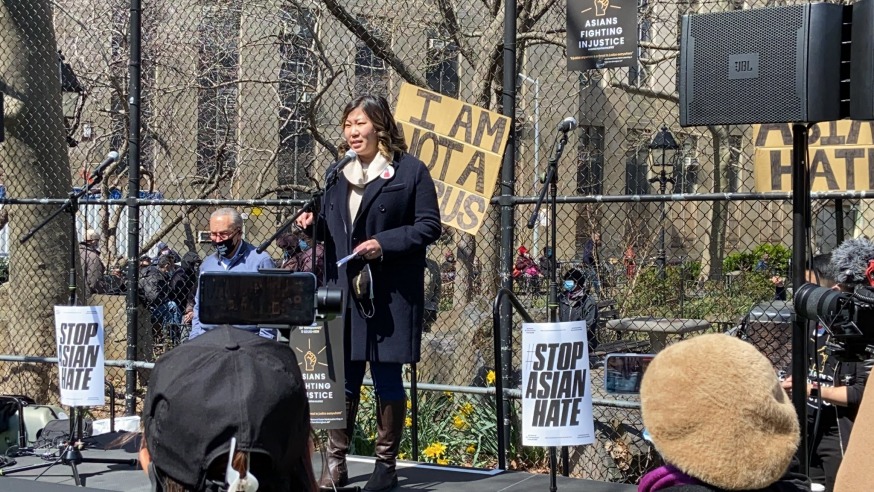
Grace Meng speaking at a #StopAAPIHate rally! (Photo: twitter)
April 28, 2022 By Allie Griffin
The U.S. House of Representatives on Tuesday passed Queens Congresswoman Grace Meng’s bill that seeks to create the first national museum dedicated to preserving the history, culture and accomplishments of Asian Pacific Americans.
The bipartisan bill — which was co-sponsored by 120 members and endorsed by countless AAPI organizations — passed the House unanimously and will now head to the U.S. Senate ahead of Asian Pacific American Heritage Month, which kicks off Sunday.
“For the last seven years, I have worked to push this legislation through Congress, and I am thrilled that it has finally passed out of the House of Representatives,” said Meng, who is the first vice-chair of the Congressional Asian Pacific American Caucus.
The legislation, titled the “Commission to Study the Potential Creation of a National Museum of Asian Pacific American History and Culture Act,” would create a commission of eight experts in museum planning and/or Asian Pacific American history to examine the feasibility of establishing, funding and operating such a museum in Washington.
Meng said that Asian Americans and Pacific Islanders have been pivotal to the U.S.’s growth since its founding.
“We have helped make the United States the greatest country in the world, but unfortunately many remain unaware of the crucial role we’ve played throughout our history,” she said. “It’s time for that to change and creating a national museum would ensure there is a physical space to commemorate and share our story with future generations.”
Meng’s bill would require the commission to complete a number of duties to determine the feasibility of creating the museum within 18 months.
The commission would be required to produce a report that would detail what’s needed to establish the museum. The report would involve the development of a fundraising plan; the feasibility of acquiring collections for the museum; possible locations for the museum; and a legislative plan as to how to establish and construct the museum.
The legislation would also require the commission to determine whether the museum should be part of the Smithsonian Institution, which is the world’s largest museum and research complex located in Washington.
The House Speaker, Senate Majority Leader, House Minority Leader and Senate Minority Leader would be tasked with appointing the commission’s eight members.
Meng’s legislation was applauded by Asian American community leaders from across the country.
“The passage of this bill is an important first step in recognizing the history and lived experiences of AAPI communities,” said John Yang, president and executive director at Asian Americans Advancing Justice. “Creating a national resource and institution dedicated to public education of Asian American and Pacific Islander histories is critical to building a more inclusive future.”
Jo-Ann Yoo, Executive Director of the Asian American Federation, said the bill’s passage was particularly important in the current day, as hate crimes against the AAPI community have risen nationwide since the onset of the pandemic.
“In the face of the continued harm inflicted on Asian Americans by hatred and ignorance, knowledge and understanding is the best balm,” Yoo said. “We believe along with Rep. Grace Meng, that a National Museum of AAPI History and Culture will help us learn from and celebrate our history, present a perspective that will help Americans bridge division, and lead to greater empathy among diverse races.”
The legislation must pass the Senate next to become law. Nonetheless, Meng said she was happy for all Asian Americans and Pacific Islanders that it’s now a step closer
“Our achievements, history, and experiences are [as] American as everybody else’s, and we must recognize that the narrative of the Asian Pacific American community is woven into our greater American story,” she said. “I am excited that we are one step closer to this bill becoming law, and one step closer to a national museum filled with our Asian Pacific American history being established.”
One Comment

This is all well and good. More to worry about Grace How about Changing the No Bail law first. Democratic Socialists like Ms. Meng priorities are backwards as usual My point what good is more cops when you can’ t keep anyone in jail under the vurrent law.?